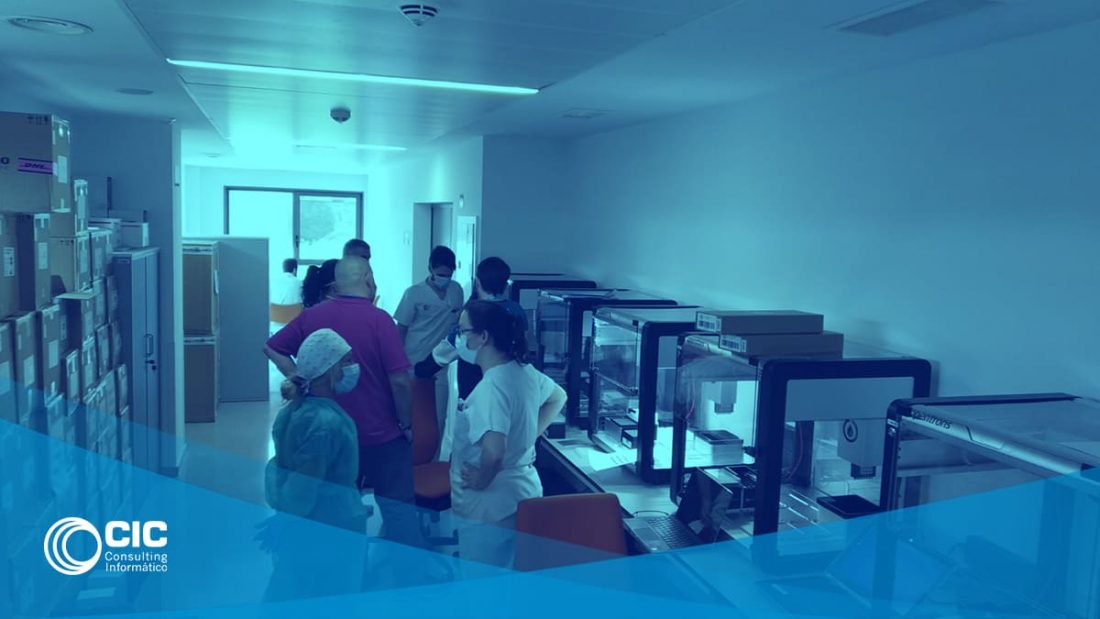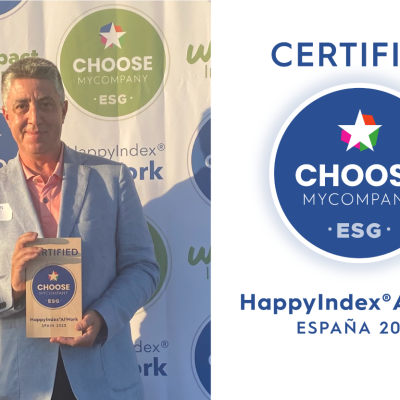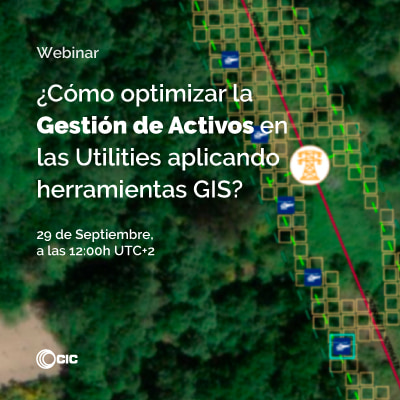
Part of the CIC Consulting Infomático Systems and Development Team, together with the Microbiology Lab of the Marqués de Valdecilla University Hospital in Santander, Spain have participated, altruistically, in the installation, configuration and programming of 8 robots that have increased the capacity to diagnose the coronavirus. This system allows for 2400 PCR tests to be carried out daily, guaranteeing quick and reliable results.
The 8 robots, which have proven themselves to be a valuable resource in COVID -19 research, are equipped with open source hardware and software, which enables them to be adapted to different uses. This allows them to be used with different reagents from any brand. Therefore, eliminating any dependence on any particular reactive. If there were to be a deficit in the market, it wouldn’t be a problem. Therobots can adapt to the protocols of each lab.
New robotic station with 8 intelligent robots
CovidRobots is a project that the Covidwarriors (https://www.covidwarriors.org/) organization has been able to bring to different hospitals in Spain. The hospitals most affected by covid were the first ones to receive assistance: Instituto de Salud Carlos III, La Paz Hospital in Madrid and Hospital Clinic and Vall d’Hebron in Barcelona. 8 robots, that worked with open code hardware, were used for massive Covid-19 PCR testing.
Mainly financed by the private sector and thanks to the contacts that the creators of this project had, it turned out to be a private and public joint venture.
When the creators of this project saw the possibility of making their project a reality, they came across the problem that the Spanish Health Ministry needed to ask for additional funds that would require time to get. Time was of the essence in Spain, so they got in touch with their contacts in the private sector and were able to get companies like Inditex, Banco Santander, Apple España, Merlín, Ikea, Manpower, Telefónica, Renfe and other companies to donate money, so the hospitals could get a hold of the robots they needed. They collaborated in the purchase, logistics, computers, engineers and installation of the robots.
The donations for the Spanish Health Ministry regarding PCRs are being coordinated by five people in the Covidrobots project: Rocío Martínez, researcher at King´s College in London; Sandra Figaredo; senior consultant at Llorente & Cuenta; María Parga, executive at BME and president at the Alastria Consortium; Andreu Veà, researcher and promoter of CovidWarriors (parent of the Covidrobots project) and Javier Colàs, ex-president of Medtronic Spain and currently innovation director at Esade.
Once the project had been put in place in the 4 main hospitals, and once the results had been successful, the initiative was extended to other hospitals in Spain, as was the case with the Marques de Valdecilla University Hospital, in Santander.
This makes the Marques de Valdecilla University Hospital one of the first, of the 17 hospitals that were selected, that found private donations and partners, in Cantabria, like CIC Consulting Informático. The latter was responsible for implanting, installing, configuring and calibrating these Super Robots, as well as, developing the protocols defined by the microbiological laboratory at the hospital that would guarantee an accurate diagnosis on the tests that were done.
Here is a list of the other Spanish hospitals where the project has been established:
- Complejo Hospitalario Universitario de Santiago de Compostela. GALICIA
- Hospital Universitario Nuestra Señora de Candelaria de Tenerife. CANARIAS
- Hospital Universitario de Badajoz. EXTREMADURA
- Hospital Regional (Carlos Haya) Málaga. ANDALUCÍA
- Hospital de Son Espases Palma de Mallorca. BALEARES
- Hospital Clínico de la Fe de Valencia. VALENCIA
- Hospital de Cruces en Bilbao. PAIS VASCO
- Hospital Germans Trias i Pujol (Can Ruti). Badalona. CATALUÑA
- Hospital Virgen del Rocío. Sevilla. ANDALUCÍA
- Hospital Gregorio Marañón. MADRID
- Complejo hospitalario Universitario de Cáceres. San Pedro de Alcántara.
- Complejo Universitario Hospitalaria A Coruña, pendiente de realizar la gestión con su donante
CIC Collaborates in the CovidRobots Project
The project was made up of two phases. The First Phase consists of the installation, configuration, leveling and calibration of the 8 robots; two of which were in the lab and the other 6 in an adjacent area. The Second Phase was dedicated to the development of protocols and trials. Developing defined protocols was the responsibility of the Microbiology Laboratory that would later carry out the tests.
“The robots that execute the type B protocols have been the most interesting to carry out because the process was more complex, and for this reason, to have been able to develop them without prior knowledge in microbiology has been very satisfactory for us”
Daniel Peñil, is a member of the CIC development team that collaborated in this project.
In these protocols we carry out the extraction of RNA from a genetic sample. This gives us information in the analysis through the use of different reagents and support through magnetic modules, like the temperature, to be able to get pure RNA samples that can be fed to type C robots to continue the process.
Collaborative project among the hospitals that are implementing the project
The robots work with open source hardware, which allows us to customise them for every hospital. In order to counter any variations and make the development process more efficient, we maintain constant contact with the different teams involved in the hospitals where the robots have been implanted or will be.
Furthermore, the different protocols that have been developed are housed in public data repositories that can help with the CovidRobots project. Furthermore, any person or institution that could be interested in the work that has been carried out can access it.
A Challenge for CIC
The CovidRobots project was a definite challenge for CIC. The altruistic nature of the project has allowed us to work with tools and areas that we had not had the opportunity to do before, for example robotics and Python programming focused on the health sector.
The CIC team, together with the staff of the Microbiology Laboratory of the Hospital Universitario Marques de Valdecilla, have carried out indispensable work for the functioning of the whole project. Not only was the work interesting and work-intensive, but it also carried a fair amount of risk – “one thing is to put together all the pieces and another for it to be reliable”.
“Our purpose is to help in the fight against Covid-19 to the best of our ability, working to put into operation technological solutions that allow companies and organizations to advance”
María Lledías, Marketing Manager at CIC Consulting Informático




